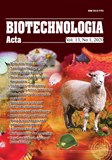ISSN 2410-776X (Online)
ISSN 2410-7751 (Print)

Biotechnologia Acta V. 13, No 1, 2020
Р. 45-55, Bibliography 17, English
Universal Decimal Classification: 619:616.98-078:579.841.95:[577.2.08+57.083.33]:636.4
https://doi.org/10.15407/biotech13.01.045
O. B. Zlenko 1, C. Popp 2, H. von Buttlar 2, A. P.Gerilovych 1, J. Schwarz 2
1 National Scientific Center «Institute of Experimental and Clinical Veterinary Medicine», Kharkiv, Ukraine
2Bundeswehr Institute of Microbiology, Munich, Germany
To the present day, a Francisella infection is diagnosed by a mandatory combination of two methods: a screening Enzyme-linked Immunosorbent Assay (ELISA) and a confirmatory Western Blot (WB), both based on the use of Francisella tularensis subsp. holarctica lipopolysaccharides (LPS) as a capture antigen. The purpose of the present work was to obtain and assess three recombinant proteins (FTT1696, FTT0077, FTT0975) as antigens in an indirect ELISA (iELISA) with the final goal to replace the confirmatory WB. Cloning strategy in vector pASG103, expression in E. coli and purification of proteins using Strep-system are described in detail in this report. Sera with confirmed antibody titers against F. tularensis reacted with all three antigens, which make them suitable for the serological detection of F. tularensis in swine and humans.
Key words: ELISA, FTT1696, FTT0077, FTT0975, recombinant proteins, tularemia.
© Palladin Institute of Biochemistry of National Academy of Sciences of Ukraine, 2020
References
1. Chong A., Celli J. The Francisella intracellular life cycle: toward molecular mechanisms of intracellular survival and proliferation. Front Microbiol. 2010, 1 (138), 1–12. https://doi.org/10.3389/fmicb.2010.00138
2. WHO Guidelines on Tularemia. WHO Press. 2007, 115 p.
3. Oyston P., Sjostedt A., Titball R. Tularemia: Bioterrorism Defence Renews Interest n Francisella Tularensis. Nature Rev. Microbiol. 2004, 2 (12), 967?979. https://doi.org/10.1038/nrmicro1045
4. Dahouk A. L., Nockler S. K., Tomaso H., Splettstoesser W., Jungersen G., Riber U., Petry T., Hoffmann D., Scholz H., Hensel A., Neubauer H. Seroprevalence of Brucellosis, Tularemia, and Yersiniosis in Wild Boars (Sus scrofa) from North-Eastern Germany. J. Vet. Med. 2005, 52 (10), 444?455. https://doi.org/10.1111/j.1439-0450.2005.00898.x
5. Hub?lek Z., Treml F., Juicov? Z., Huady M., Halouzka J., Jan?k V., Bill D. Serological survey of the wild boar (Sus scrofa) for tularaemia and brucellosis in South Moravia, Czech Republic. Vet. Med. 2002, 47 (2?3), 60?66. https://doi.org/10.17221/5805-VETMED
6. Geiger J. C. Tularemia in cattle and sheep. Cal. West. Med. 1931, 34 (3), 154?156. https://doi.org/10.1007/BF01627743
7. Stupnitskaya V. M., Marinov M. P., Litvinenko Ye. F., Slesarenko V. V., Slesarenko A. S.,. Khizhnskaya O. P., Stepanova I. A., Buyalo S. G. Natural tularemia foci on the territory of the Ukrainian SSR. J. Microbiol. Epidemiol. Immunobiol. 1965, N 10, P. 94?98
8. Hightower J., Kracalik I., Vydayko N., Goodin D., Glass G., Blackburn J. Historical distribution and host-vector diversity of Francisella tularensis, the causative agent of tularemia, in Ukraine. Parasites and Vectors. 2014, V. 7, P. 453?458. https://doi.org/10.1186/s13071-014-0453-2
9. Rusev I. T., Mogylevskii L. Ya., Boshenko Yu. A. Zakysilo V. N. Biocenotic features of natural foci of tularemia in the steppe zone of Ukraine. Visn. Sumy State Un-ty. 2005, 7 (79), 25?35. (In Russian).
10. Nakajima R., Escudero R., Molina D., Rodr?guez-Vargas M., Randall A., Jasinskas A., Pablo J., Felgner P., AuCoin D., Anda P., Davies D. Towards Development of Improved Serodiagnostics for Tularemia by Use of Francisella tularensis Proteome Microarrays. J. Clin. Microbiol. 2016, 54 (7), 1755?1765. https://doi.org/10.1128/JCM.02784-15
11. Porsch-Ozc?r?mez M., Kischel N., Priebe H., Splettst?sser W., Finke E., Grunow R. Comparison of enzyme-linked immunosorbent assay, Western blotting, microagglutination, indirect immunofluorescence assay, and flow cytometry for serological diagnosis of tularemia. Clin. Diagn. Lab. Immunol. 2004, 11 (6), 1008?1015. https://doi.org/10.1128/CDLI.11.6.1008-1015.2004
12. Silva M. T. Classical Labeling of Bacterial Pathogens According to Their Lifestyle in the Host: Inconsistencies and Alternatives. Front Microbiol. 2012, 3 (71), 1–7. https://doi.org/10.3389/fmicb.2012.00071
13. Heizmann W., Botzenhart K., Doller G., Schanz D., Hermann G., Fleischmann K. Brucellosis : serological methods compared. J. Hyg. 1985, V. 95, P. 639–653. https://doi.org/10.1017/S0022172400060745
14. Moyer N. P., Evins G. M., Pigott N. E., Hudson J. D., Farshy C. E., Feeley J. C., Hausleret W. J. Comparison of serological screening tests for brucellosis. J. Clin. Microbiol. 1987, V. 25, P. 1969–1972. https://doi.org/10.1128/JCM.25.10.1969-1972.1987
15. Schmitt P., Splettst?sser W., Porsch-Ozc?r?mez M., Finke E. J., Grunow R. A novel screening ELISA and a confirmatory Western blot useful for diagnosis and epidemiological studies of tularemia. Epidemiol. Infect. 2005, 133 (4), 759?766.https://doi.org/10.1017/S0950268805003742
16. Manual of Diagnostic Tests and Vaccines for Terrestrial Animals 8th Edition. OIE. 2018, P. 675?682.
17. SI Sumy OLC MoH of Ukraine (Official web-page) Available at: http://ses.sumy.ua/informacya-dlya-naselennya/1027-epzootichna-situacya-z-tulyaremyi-v-oblast.html (accessed 25 December 2019).

